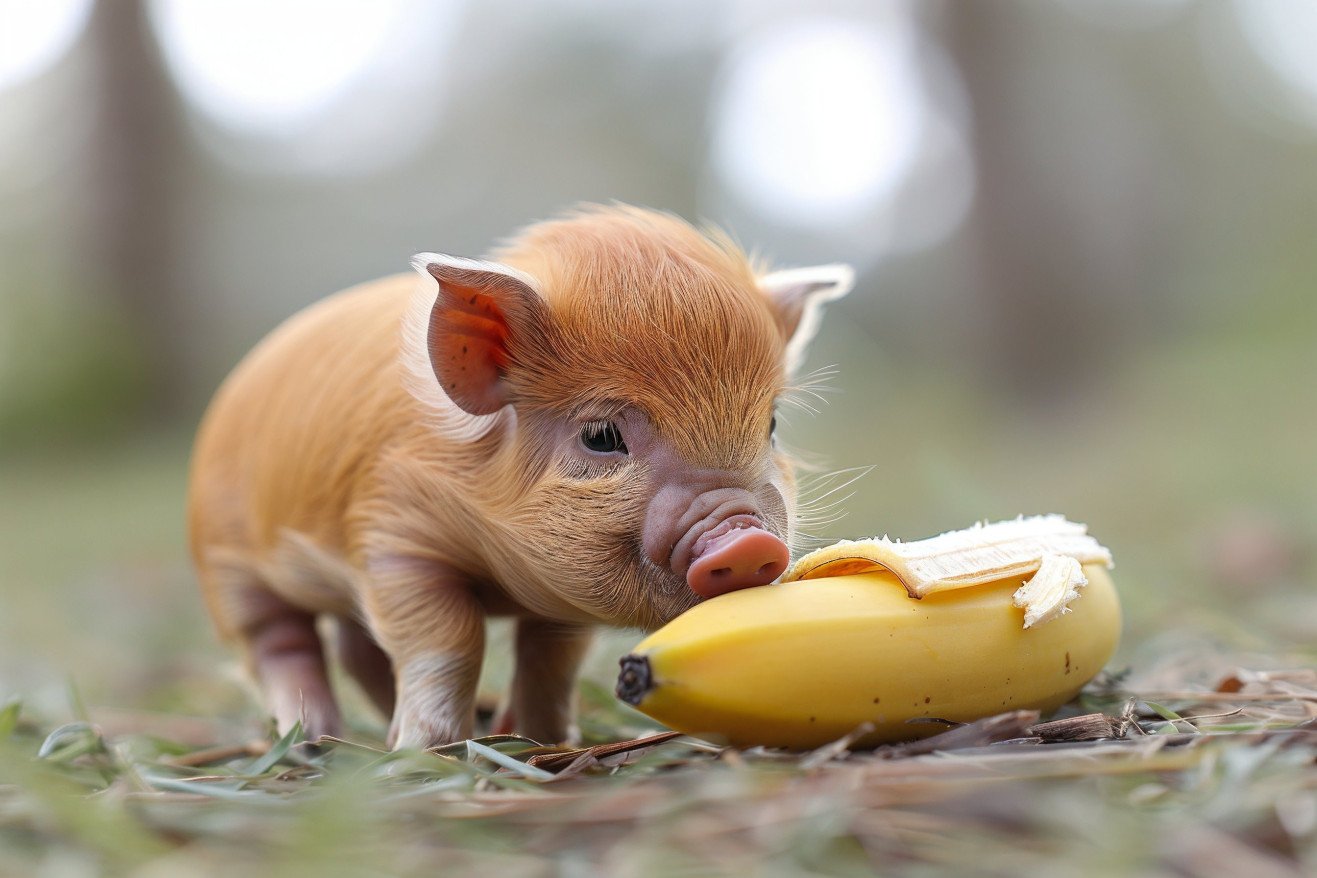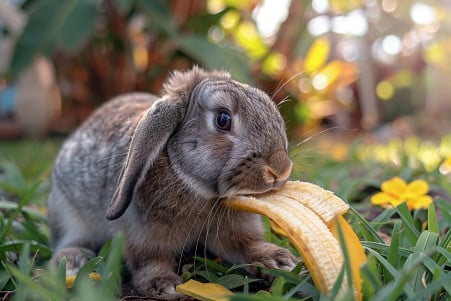Can Pigs Eat Bananas? The Nutritional Pros and Cons
26 May 2024 • Updated 25 May 2024

If you've ever wanted to share your banana with a pet pig, you might have asked yourself, "Can pigs eat bananas?" Here's what you need to know. Pigs can eat bananas! Bananas are packed with vitamins and minerals that can be good for pigs, including potassium, magnesium, fiber, and vitamins C and B6. However, it's important to remember that bananas should be fed to pigs as a treat and not as a staple food.
In this article, we'll take a deep dive into the scientific literature, including information from agricultural research, veterinary nutrition, and pig farming to find out the potential benefits and drawbacks of feeding bananas to pigs. We'll look at the nutritional advantages, potential downsides, portion control, and tips from experts on how to safely add bananas to your pig's diet. By the time you're done reading, you'll have all the information you need to make sure your pig can enjoy this sweet treat in a way that's safe and healthy.
Can pigs eat bananas?
Nutritional Benefits of Feeding Bananas to Pigs
Bananas are full of important nutrients that can help pigs grow and stay healthy. They are high in potassium, magnesium, fiber, and vitamins C and B6, says New Life on a Homestead. The vitamin B complex that bananas contain helps with energy metabolism and red blood cell formation. Meanwhile, the mineral manganese, which is found in high levels in bananas, is important for bone formation, nutrient absorption, and antioxidant activity.
These nutrients help with different aspects of pig development. For example, potassium is important for muscle growth, while fiber is important for gut health. Vitamin C supports the immune system, and magnesium is important for protein synthesis. In addition, the carbohydrates in bananas can be a good source of energy for young pigs. Research from the NIH showed that the digestible energy content of banana meal increases as the bananas ripen.
On the other hand, bananas are also high in natural sugars. While this isn't necessarily a bad thing, feeding pigs too many bananas can cause digestive issues like diarrhea, so it's important to feed them in moderation. The nutritional content can vary depending on factors like how ripe the bananas were when they were harvested and the conditions in which they were grown, but in general, bananas can be a nutritious and healthy occasional treat for pigs if they are fed in the right way.
It's important to make sure that pigs are getting a balanced diet that takes into account the nutrients that they are getting from other sources in order to ensure that they get the most out of the vitamins, minerals, and energy that bananas can provide.
Using Banana Meal in Pig Diets: Best Inclusion Levels and Feeding Approaches
Studies have demonstrated that banana meal (dried, ground bananas) can be included in pig diets at levels of up to 60% without negative effects on growth performance, as noted in a Journal of Animal Science article. The digestibility and energy content of banana meal are highest when the bananas are harvested at later stages of ripeness, with the best results seen when the bananas are harvested 1150 days after flowering.
Feeding trials cited in a ScienceDirect article have looked at the effects of different levels of banana meal inclusion on factors such as feed conversion ratio, intestinal health, and weight gain. They have shown that banana meal can be a useful and positive ingredient when added to pig diets at the right levels.
It’s important to make sure that pigs are gradually introduced to banana meal and that they are monitored for any negative reactions. In addition, it’s important to make sure that banana meal is processed and stored properly to ensure that it maintains its nutritional value and doesn’t spoil. However, when these precautions are taken, banana meal can be a sustainable and cost-effective feed ingredient that supports pig health and growth.
Environmental and Sustainability Benefits of Banana Meal in Pig Feed
Using banana meal in pig feed can help reduce waste and support more sustainable agricultural practices. ECHO Community notes that bananas that are not suitable for human consumption can be used as pig feed, which helps reduce food waste and improve resource efficiency. In addition, using locally available banana meal in pig feed can help reduce the environmental impact of transporting commercial feed long distances.
Incorporating pigs into smallholder farming systems can help create a closed-loop system in which banana waste is turned into meat and manure for fertilizer. The ECHO Asia farm uses banana stems as the base of their on-farm pig feed, which demonstrates the potential for sustainable nutrient cycling. Feeding pigs with banana meal may also open up marketing opportunities as a sustainable or organic product.
Although more research is needed to determine the specific environmental impacts, the potential to use banana waste and reduce dependence on commercial feed suggests that banana meal could be a viable and sustainable option for pig farmers. However, as noted in the previous section, proper processing and feeding methods will be important to ensure that banana meal can be used in pig diets safely and effectively.
Health and Food Safety Concerns of Feeding Bananas to Pigs
While bananas are safe for pigs to eat, there are some health concerns to consider. New Life on a Homestead notes that banana peels can be a choking hazard, so they should be cut or shredded before being fed to pigs. Additionally, overfeeding pigs bananas can cause digestive problems, including diarrhea and indigestion, because of their high sugar content.
It's also important to consider the health and safety of banana meal. Proper storage and handling of banana meal is important to ensure that it doesn't become contaminated with bacteria or mold. A study published by the NIH notes that it's important to manage the risk of African Swine Fever Virus (ASFV) transmission through contaminated feed and feed ingredients. While there are no known food safety risks of eating pork from pigs that have been fed banana meal, it's still important to make sure that the pork is cooked and handled properly.
By making sure to address any health or food safety concerns, farmers can make sure that they're feeding pigs bananas in a way that's safe and healthy. However, it's also important to make sure that the economic and practical concerns of using banana meal in pig farming are also taken into account.
Economic and Practical Implications of Using Banana Meal in Commercial Pig Production
The economic viability of using banana meal as a feed ingredient in commercial pig production will depend on several factors. As reported by Asian Agribiz, Vietnamese banana exporter Hoang Anh Gia Lai (HAGL) Group has determined that banana meal can be used to replace up to 40% of a pig's diet and still be cheaper than conventional commercial feed. This indicates that in areas with a high volume of banana production, banana meal could be a cost-effective alternative to traditional pig feed.
However, it would likely take a more organized system of banana meal production and distribution to make it a viable option for commercial pig producers. ScienceDirect explains that the proper regulation and legalization of bioactive enrichment of food products from banana peel would also need to be in place to ensure safety. Potential hurdles include securing a consistent supply of banana waste, creating effective processing techniques, and overcoming any consumer or regulatory concerns about the use of banana meal in pig feed.
In general, the economic and practical implications of using banana meal in commercial pig production will be contingent on the specific regional context and the ability to overcome logistical and regulatory obstacles. It will be important to thoroughly assess these implications to determine whether it's feasible to use banana meal as a feed ingredient in pig diets on a larger scale.
Conclusion: Weighing the Benefits and Risks of Feeding Bananas to Pigs
When used in moderation and as part of a nutritionally balanced diet, bananas can offer several benefits to pigs. These include supplying essential vitamins, minerals, and energy, reducing food waste, and supporting sustainable agriculture. At the same time, there are several potential risks, including the high sugar content, choking hazards, and cost.
To ensure the safe and effective use of banana meal in commercial pig diets, it's important to develop appropriate feeding protocols, processing techniques, and quality assurance practices. In general, the decision to use banana meal as a feed ingredient will depend on the unique needs and goals of individual farming operations.


